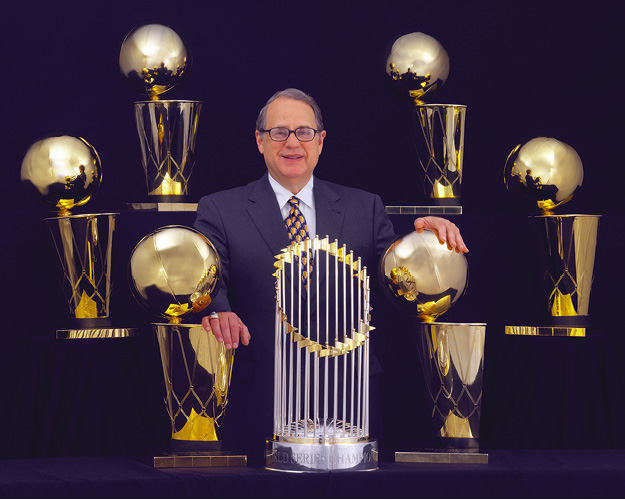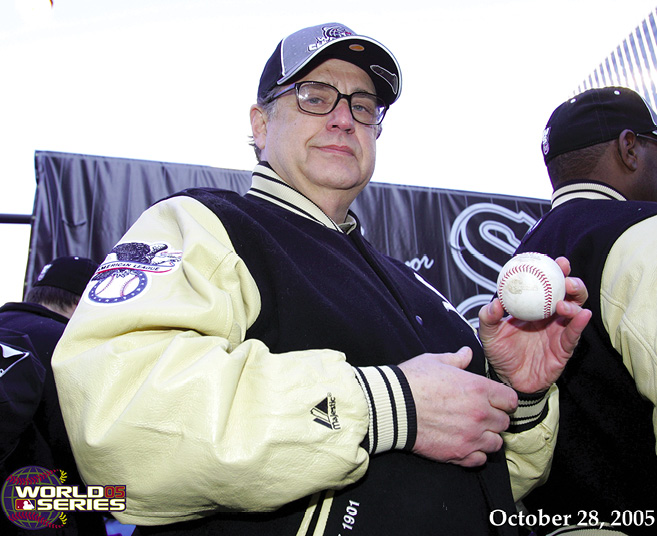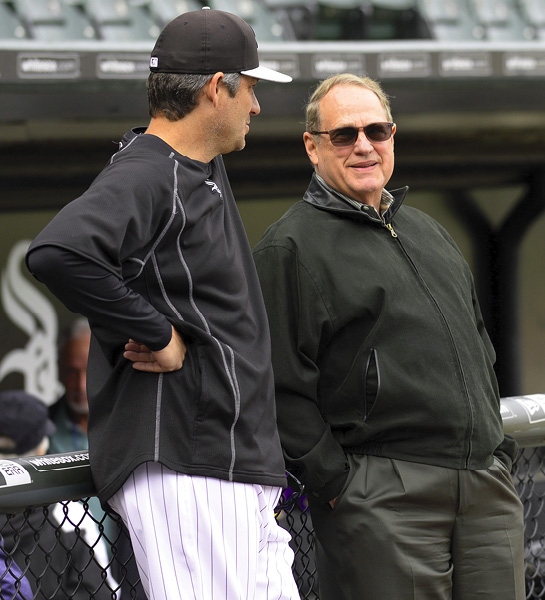- Home
- Media Kit
- Current Issue
- Past Issues
- Ad Specs-Submission
- Ad Print Settings
- Reprints (PDF)
- Photo Specifications (PDF)
- Contact Us


![]()
ONLINE


Jerry Reinsdorf with Chicago White Sox
and Chicago Bulls championship trophies
A Lasting Legacy
Editors’ Note
Jerry Reinsdorf is a CPA and a lawyer. He started his professional life as a tax attorney with the Internal Revenue Service. He has been the head of the White Sox and Bulls for over 30 years. As the Owner and Chairman of the Chicago Bulls since 1985, he has turned the franchise into a lucrative business that won six NBA Championships in the 1990s. As a baseball owner since 1981, the White Sox has won a World Series in 2005. Since the early 1990s, he has been considered one of the most, if not the most, influential basketball owners. In April of 2016, Reinsdorf was elected to the Naismith Memorial Basketball Hall of Fame as a contributor.
Would you talk about how your career started and, looking back, are you surprised by how much sports have been a part of your life?
I never had any ambitions to be in sports or dreamed of being in sports. I just wanted to own a car as a kid growing up in Brooklyn. It evolved – one thing led to another, and then I was in sports.
As far as the success of it, if I have a talent, it’s finding good people and letting them do their jobs. Running a sports team is not a lot different from running any other business. One needs good people.
One identifies the positions that have to be filled and hires good people to fill them. The CEO is a long-range planner, a concept guy, but the work is done by the people put in place.

Jerry Reinsdorf in a ticker-tape parade following
the Chicago White Sox 2005 World Series win
Is it more about finding people who have had the experience within that sports realm or is it more about leadership skills?
I look for people who are going to work hard, and who I think will be loyal. It helps if they have a background in sports but depends on the position.
Hardly anybody leaves; almost everyone here worked his or her way up the line. Our new hires are generally at the lower level, and they work their way up. Rarely do we go outside.
Is the CEO position in sports similar to that of a CEO in more traditional businesses? Do the talents translate?
It is. The biggest difference between an ordinary business and sports is the media. Everybody has an opinion on what I’m doing.
When I was running a real estate business, nobody cared what I was doing except me. But in sports, everyone is an expert and has an opionion, be it a writer or, with the Internet now, anyone can post anything.
I have to fight the temptation to listen to the media; I have to make the decisions I think are right. That is the biggest difference between sports and other businesses.

Jerry Reinsdorf with Chicago White Sox
Manager Robin Ventura
When you have the success you have experienced with the Bulls and then things change, is it hard to adapt?
In the case of the Bulls, Michael Jordan had a lot to do with the team, but I just brought in a lot of new people. The Chicago Bulls were an undermanaged business. There were three principal owners, and they each owned 23 percent. These were three very important people nationally, and they had no time for running the business.
They also had zero season ticket salesmen. It was because season tickets could not be sold. They felt that if people didn’t want them, they could not be talked into buying them. That was the thinking of the business when I took over.
I brought in my number-two marketing guy from the White Sox and put him in charge of marketing, and then I hired a new GM, who was already working for me at the White Sox. From there, we staffed up. There were almost no employees there when I took over.
Clearly, you know how to manage effectively. Is it difficult to delegate to others when you see things being done differently from how you would do it?
I had already learned that. When I started the Balcor company, we had three or four partners, and we did everything. We grew and as we acquired properties all over the country, we had to learn to let the person managing apartment complexes set rents, even if they might not have been the ones I would have set. You have to let people make mistakes and try to correct them. There were a lot of mistakes that might not have been made if I was doing it myself, but I could not have grown the business without empowering others to take risks and make mistakes.
Looking at the impact that a team like the Bulls has on the city of Chicago, how important is it that the team be engaged in the community?
It’s very important. The best thing about owning a team is the ability to bring happiness to a community and to do good things.
When the White Sox won the World Series, one could have gone to any cemetery the next day and the graves were decorated with White Sox memorabilia – people wanted their grandparents to know the White Sox had won. There were two million people on the parade route and there wasn’t a single incident.
When the Bulls won their championships, we also had hundreds of thousands of people at the rally. When a team does well, it builds the pride of the city.
In addition to that, we have the ability to do things ordinary businesses can’t do. Our players will go to a children’s hospital and visit children, many of whom are terminally ill. That visit brings tremendous happiness to those kids, and it eases the burden on their parents.
Our players from both teams will go to inner-city schools and talk to the kids about how they started in the inner-city and how they succeeded, so there is much good that can be done.
We give thousands of autographed items to charities every year to be auctioned off for fundraisers. Every one of our players signs 600 items each year.
It goes on and on. One of the programs I’m most proud of is ACE, which stands for Amateur City Elite. It’s an inner-city baseball program for kids ages 12 to 18. We’ve had maybe a few dozen kids drafted into professional ball from that program, but the important thing is that over 100 kids in that program have gotten scholarships to four-year colleges. We’re enabling kids to go to college who would not have a chance to do so otherwise.
We hear today about how much players make, but there are many players who have foundations and do so much good. Is that message understood and can more be done to get that message out?
I think it is widely understood but not widely enough. Every team is active in its community similar to how we are. We try to tell the story, although bragging too much would mean we’re not really doing it for the right reasons. I’m concerned about going out and beating our chest, but for every activity we have, we publicize it so people can become aware of it.
You took over at a time when there were certain types of owners, businesspeople who had been around a long time. Today, there is a different type of ownership – international, younger owners with companies that are entrepreneurial. Has the landscape and interaction with fans changed?
When I first got involved, an era was ending, which was one where owners didn’t do anything except own their teams. They were 100 percent involved in their teams, and this was their life’s work.
After a few years, those guys were gone, but then we went through a period with owners who had other things they did but they loved the sport – they were fans first.
Now, without naming names, there are a lot of owners who are in the sport who bought teams to become celebrities. It is that type of owner to whom I really have a hard time relating.
Are you often surprised with a team’s season and, when you’re losing, is change often the answer?
Change for the sake of change is never the answer, but if we’ve made mistakes, we have to correct them. Of course, it has to be for a valid reason.
My two sports are very different: in basketball, there is tremendous consistency in players’ performance from year to year. Baseball is incredibly inconsistent. Looking at stats over a career, they bounce up and down. It’s because baseball is a far more mental game than any other sport. Hitting, in particular, is the most difficult thing to do in any sport. The proof is that, if one succeeds just 30 percent of the time, he’s a star.
Generally, when we start the season, I have a good idea if we’ll be good or bad – I just don’t know how good or how bad.
There are a lot of great coaches out there. How critical is that relationship between owner and coach?
It’s hard to have a successful team without that dialogue. Everybody has to be on the same page and get along. We don’t have to agree with each other. The manager doesn’t pick the 25 players on the team, but he’s part of the discussion – the final decision gets made by the GM with the owner’s approval. However, once we give the manager the 25 guys, we have to let him deploy them how he wants.
It still comes back to putting the right people in their places and letting them do their jobs.
I like to know what the thought process was. If something works out or doesn’t work out, I like to know what was being thought about when a decision was made.
Decisions are right or wrong when one makes them – 20/20 hindsight is of no value because the deal is sealed. I just like to know what the thought process was and, if the thought process was good but it didn’t work out, then so be it.
Sometimes, something works out but the reason wasn’t right, and the guy just got lucky.
During this era, there have been ownership changes over time but once you bought both teams, you stayed with them through challenging times. Did you know that it would be long-term from the start?
This is the first time I stayed long term. My experiences were four years at IRS, three years in a large law firm, five years in a small law firm, and nine years in the real estate business, but I’ve been in baseball 35 years and basketball almost that long.
First and foremost, I’m a fan. I love baseball. I grew up in Brooklyn during the Dodgers heyday. I’m still angry they left Brooklyn. I still hate Bobby Thomson.
But I was 44 years old and I remember thinking at the time, I’d like to stay 25 years because then I will be 69 and then I won’t want to work past that. Now I’m 80.
How do you see the role of the commissioner in regard to owners and has it been an effective relationship?
The commissioner is the CEO of the sport. There are different styles. David Stern has had unbelievable success and so has Bud Selig, but for different reasons.
David Stern took over a very small business that hadn’t blossomed yet. Teams were all losing money and he was able to get the union to negotiate a labor agreement that was fair to the clubs and the players where they divide revenues 50/50. The players’ union, owners, and commissioners all have the same goal in mind – to grow the revenue and the business.
David was a marketing genius and surrounded himself with terrific people, and he had some luck too. Larry, Magic, and Michael came along at the right time, but David knew how to maximize them.
Selig took over a business with the most miserable union in sports, a union that has never had an interest in growing the business. They just want to be enemies of the owners, so he had to overcome that.
Look how many years they fought testing for drugs. It didn’t happen until the players themselves forced the union to agree to testing.
That union has definitely not contributed to the growth of the business. There is no division of revenues – there, it is every man for himself so there is no unified player side for the commissioner to deal with and yet the sport has grown tremendously.
Looking at the globalization of sports, will we see an NBA franchise in an international market and are you surprised at how global the appeal is?
When we talk to people internationally about Chicago today, they no longer say Al Capone – they say Michael Jordan and the Chicago Bulls.
Basketball can also be played anyplace. Baseball and football both need equipment and a field, and as a result basketball has really spread internationally. NBA games are literally televised in hundreds of countries today and it will only continue to grow.•